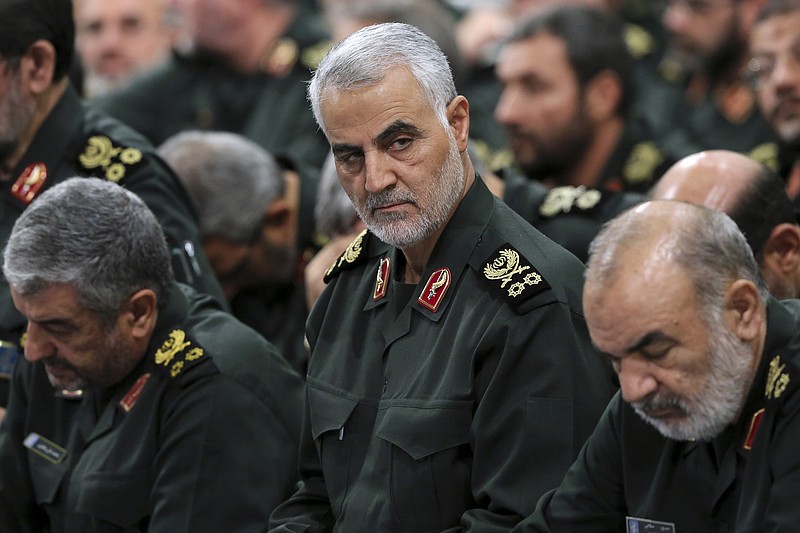President Trump has said many times he doesn't like "endless wars."
Then what was he thinking when he escalated - again - the confrontation with Iran that he began in 2018, when he decided against all advice to the contrary to pull out of the nuclear deal with a country that by all evidence was in compliance with its part of the bargain?
In the ensuing months, and smarting over Trump's 2019 unilateral sanctions against Iran, Kataib Hezbollah, a pro-Iran militia, fired rockets at a military base in Iraq, killing a contractor and wounding four troops.
Trump responded with airstrikes that killed 25 members of the militia.
(More: Iran vows 'harsh' response to US killing of top general; Tennessee local lawmakers react)
That was bad all the way around, but it got worse. As the New Year began, Kataib Hezbollah, in turn, sent its members to invade the U.S. Embassy in Baghdad.
Trump then ordered an airstrike that killed Abu Mahdi al-Muhandis, the founder of Kataib Hezbollah, and Maj. Gen. Qasem Soleimani, commander of the Iranian Quds Force, which sponsors Kataib Hezbollah and numerous other proxies around the region.
Most experts have no quibble that Soleimani was a bad guy with the blood of hundreds of Americans and thousands, even hundreds of thousands, of Arabs on his hands. His death has been compared to that of terrorist leaders like Osama bin Laden and Abu Bakr al-Baghdadi. But as foreign affairs experts have pointed out, that's not the whole of the comparison. Soleimani wasn't the leader of a terrorist gang. He was one of the most powerful people in the Iranian government. His assassination - Trump said "we ... terminated him" - cannot help but have lasting consequences.
Did Trump ask himself - or preferably his generals and aides or Congress - "What's next?" Did he ask and explore how we plot the moves forward? Or did he, Trump-like, just say do it, and do it because I said so; because I'm restless and bored; because I need new headlines?
It would be a move he's projected before. In 2012, Trump tweeted, "Don't let Obama play the Iran card in order to start a war in order to get elected."
(More: Southern, local lawmakers divided over U.S. strike that killed Iranian leader)
It's been noted that Soleimani was not the leader of a stateless terrorist organization. Does anyone think the United States would back down meekly if Iran "terminated" - with or without alleged cause - one of the most powerful figures in the U.S. government?
In a statement by the Department of Defense late Thursday, officials said: "The strike was aimed at deterring future Iranian attack plans. The United States will continue to take all necessary action to protect our people and our interests wherever they are around the world."
And on Friday, U.S. Secretary of State Mike Pompeo told CNN the airstrike that killed Soleimani was to disrupt an "imminent attack" and Americans "are safer in the region" now.
And Trump told reporters: "We did not take action to start a war."
Clearly the Iranians didn't believe that. On the contrary, Iranians were galvanized to carry Soleimani's picture in the streets and vowed to exact "severe revenge."
The rest of the world doesn't believe it either.
The French Minister of State for Europe and Foreign Affairs Amélie de Montchalin on Friday told France's RTL radio: "Today we wake up to a more dangerous world."
Pompeo countered to CNN: "The French are just wrong about that," and he told his foreign counterparts in other countries that the U.S. is committed to de-escalation.
(More: Pentagon says US airstrike killed powerful Iranian general)
But then Pompeo's State Department tweeted: "Due to heightened tensions in Iraq and the region, we urge U.S. citizens to depart Iraq immediately. Due to Iranian-backed militia attacks at the U.S. Embassy compound, all consular operations are suspended. U.S. citizens should not approach the Embassy."
And the Pentagon quickly said it would deploy 3,500 additional troops to the Middle East.
New York Gov. Andrew Cuomo sent the National Guard to New York City airports.
It is a time fraught with concern.
And the fact that Trump and Pompeo are part of it makes that concern far sharper.
